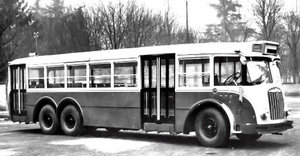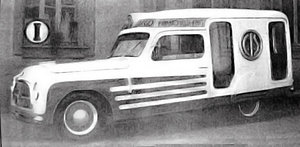Difference between revisions of "Varesina"
m |
m |
||
| (4 intermediate revisions by the same user not shown) | |||
| Line 1: | Line 1: | ||
{{X}} | {{X}} | ||
| − | [[Image:varesinalogo.jpg|180px|center| | + | [[Image:varesinalogo.jpg|180px|center|145px]] |
| + | [[Image:varesina_fiat_1500_veicolo_pubblicitario_CIS_1951.jpg|thumb|right|300px|'''1951 Varesina Fiat 1500 built to advertise ''CIS''''']] | ||
'''Carrozzeria Varesina''' (established [[1845]] in [[Varese]]) was an Italian [[coachbuilder]], known for their work on industrial vehicles such as [[double-decker buses]] for both touring and urban transport. | '''Carrozzeria Varesina''' (established [[1845]] in [[Varese]]) was an Italian [[coachbuilder]], known for their work on industrial vehicles such as [[double-decker buses]] for both touring and urban transport. | ||
| − | Among their models | + | Among their models were ten units of the [[Alfa Romeo]] "Filobus" 110 AF (1939). They also made [[prototypes]] bodies for car manufactures such as [[Lancia]] and [[Zagato]]. |
| − | |||
| − | + | A current company with the same name and area of expertise (established [[1975]]) resides in [[Ospieta di Bollate]]. | |
| − | |||
| − | + | The Alfa Romeo 1603 situated previously in booth Rolled 12517 cc Cylinders and a bore 125 X 170, 6 cylinders, diesel or methane gas to power producing around 140 HP + with a manual transmission turns to the engine right. | |
| − | |||
| − | |||
| − | + | ||
| + | '''Urban built versions were produced:''' | ||
| + | *[[Tallero]] workshops (12 unity built in 1934 35) | ||
| + | *[[Macchi]] (8 units at first with engine to gassogeno built in 1937) | ||
| + | *'''Varesina''' (12 units built in 1940) | ||
| + | *Inter-city versions built by coachwork [[Caprini]] (2 units built in 1950) | ||
| + | |||
| + | |||
| + | Note: The versions built by [[Tallero]] and [[Macchi]] had the backwards booth with outside hood originally. Numerous units were damaged during the bombardments in 1943. In the postwar period all the cars were rebuild by Caprini or Varesina bodies, with an advanced booth and diesel engine or to methane. The last examples were produced towards the end of 1960. | ||
[[Image:110A_Varesina.jpg|thumb|right|300px|'''Autobus Alfa Romeo 110 A''' <small>Image comes from the Historical Files of [[Alfa Romeo]] S.p.A. of Arese (Milan).</small>]] | [[Image:110A_Varesina.jpg|thumb|right|300px|'''Autobus Alfa Romeo 110 A''' <small>Image comes from the Historical Files of [[Alfa Romeo]] S.p.A. of Arese (Milan).</small>]] | ||
| Line 22: | Line 27: | ||
| − | + | {{-}} | |
| + | {{A-Z multipage list|Car Information and Photos by Marque|Information and Photos by Marque|}} | ||
| + | {{A-Z multipage list|Motorcycle Information and Photos by Marque|Motorcycle Information and Photos by Marque|}} | ||
{{Car Information and Photos by Marque}} | {{Car Information and Photos by Marque}} | ||
{{Motorcycle Information and Photos by Marque}} | {{Motorcycle Information and Photos by Marque}} | ||
Latest revision as of 18:11, 20 November 2009
Carrozzeria Varesina (established 1845 in Varese) was an Italian coachbuilder, known for their work on industrial vehicles such as double-decker buses for both touring and urban transport.
Among their models were ten units of the Alfa Romeo "Filobus" 110 AF (1939). They also made prototypes bodies for car manufactures such as Lancia and Zagato.
A current company with the same name and area of expertise (established 1975) resides in Ospieta di Bollate.
The Alfa Romeo 1603 situated previously in booth Rolled 12517 cc Cylinders and a bore 125 X 170, 6 cylinders, diesel or methane gas to power producing around 140 HP + with a manual transmission turns to the engine right.
Urban built versions were produced:
- Tallero workshops (12 unity built in 1934 35)
- Macchi (8 units at first with engine to gassogeno built in 1937)
- Varesina (12 units built in 1940)
- Inter-city versions built by coachwork Caprini (2 units built in 1950)
Note: The versions built by Tallero and Macchi had the backwards booth with outside hood originally. Numerous units were damaged during the bombardments in 1943. In the postwar period all the cars were rebuild by Caprini or Varesina bodies, with an advanced booth and diesel engine or to methane. The last examples were produced towards the end of 1960.

External Links
| Car Information and Photos by Marque: A - B - C - D - E - F - G - H - I - J - K - L - M - N - O - P - Q - R - S - T - U - V - W - X - Y - Z |
| Motorcycle Information and Photos by Marque: A - B - C - D - E - F - G - H - I - J - K - L - M - N - O - P - Q - R - S - T - U - V - W - X - Y - Z |

